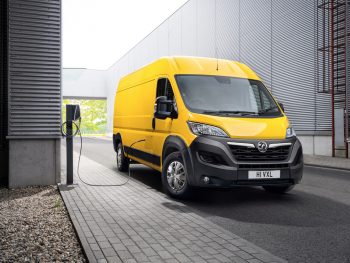New van registrations fell to 21,597 units in April, down 29.1% year-on-year despite strong demand as supply chain pressures hamper deliveries.

The Society of Motor Manufacturers and Traders (SMMT) said the decline in registrations for April was amplified by comparison with 2021’s best-on-record performance. But even compared with pre-pandemic 2019, April this year was still 12.2% down.
Registrations fell across all sectors – large vans dropped 19.15% but gained a nine-percentage point increase in market share to 75.1%. This was on the back of more significant declines in registrations of medium-sized and small vans, which fell by 48.6% and 48.2% respectively as components shortages restricted supply. Sales of pickups dropped by 44.0%, while 4×4 registrations dropped by 77.8%.
But eLCV uptake continued to grow and registrations of these vehicles in April increased by 52.7% year-on-year to 919 units – representing one in 24 new vans joining the road. That’s still some way behind the one in 10 new cars that are now electric and the SMMT renewed its call for policies that incentivise operators to make the switch.
The trade body also downgraded its outlook for new van registrations from 363,000 units to 328,000 in 2022 – 7.7% down on 2021. eLCVs are expected to account for 6.3% of registrations.
Mike Hawes, SMMT chief executive, said: “Despite the global supply pressures on the UK’s light commercial vehicle sector, manufacturers are prioritising the most popular models, while investing in electric options where demand is slowly but steadily growing. Constrained supply, however, does mean that 2022’s new van market is expected to be down on last year’s bumper uptake.
“Even so, while market conditions remain challenging for van operators across the UK, now is the time for those looking to renew their fleets to put their orders in, as interest rates remain historically low and an increasing range of fuel-efficient and electrified models are now available.”
Andy Hill, strategic LCV fleet engineering consultant at Lex Autolease, said it was encouraging to see battery electric vans continue to attract interest as businesses accelerate their electrification plans.
“While transitioning to an electric fleet remains vital for a sustainable future, commercial vehicles still need to be fit for purpose and legally compliant – making vehicle selection a key priority. That’s why we need to see policymakers and manufacturers continue to work together to help build a zero-emission van market that has both a widespread choice of vehicles and the necessary charging infrastructure.”
The SMMT data has been published as latest figures from ATS Euromaster show the impact of the supply issues and resultant longer vehicle lifecycles on fleet costs. With operators running vans for longer due to the shortages of new vehicles, SMR costs are rising – ATS data shows a 17% increase in average SMR spend compared to pre-pandemic.

